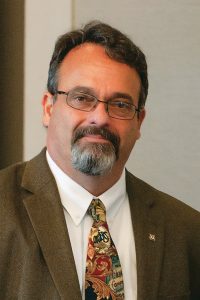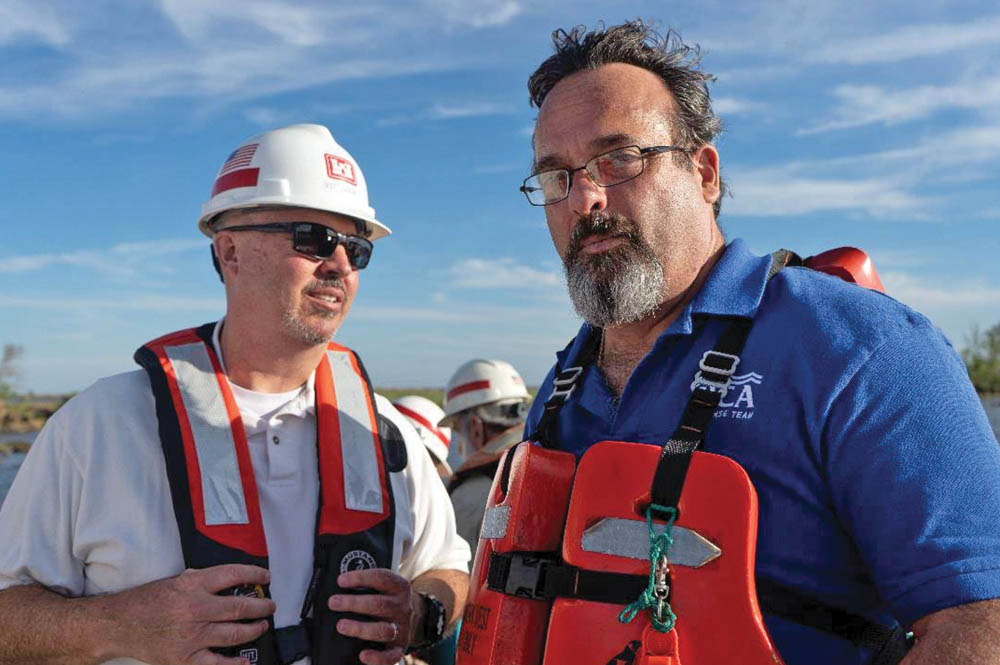Gulf Intracoastal Waterway (GIWW) stakeholders will gather in New Orleans August 7–9 for the 119th annual seminar of the Gulf Intracoastal Canal Association (GICA). GICA President Paul Dittman sat down with The Waterways Journal to discuss current issues facing the waterway and what seminar attendees can expect from the upcoming seminar.

WJ: Emergency repairs and lock closures on the GIWW will be the focus of one session at the GICA seminar. Beyond the GIWW, the recent closure at Demopolis Lock and the ongoing closure at Holt Lock, both on the Black Warrior-Tombigbee Waterway, have had at least indirect impacts on the canal. What have emergency closures taught you about the capacity for the Corps and industry to work together during emergency closures? What’s the message Congress needs to hear regarding waterway infrastructure?
PD: First, I want to say the U.S. Army Corps of Engineers (USACE) project managers I work with on an almost daily basis do a fantastic job, given the resources they have to work with. GICA’s relationship with them has never been stronger. For example, during the extended emergency repairs associated with Algiers Lock last fall, the Bayou Sorrel Lock program manager proactively reached out to me with a plan to manage the maintenance work schedule at Bayou Sorrel in anticipation that all traffic, which normally uses the Algiers Lock, would divert to the Port Allen Route. We had a traffic management plan in place and ready to go before traffic diverted.
What Congress needs to hear is this: the issue of aging and failing infrastructure is not going to get better with time. The longer we delay major maintenance and replacement of aging infrastructure, the frequency and severity of failures and the associated impacts on the national economy and supply chain will only get worse.
WJ: You communicate with member companies a lot about moveable bridges that cross the GIWW. What steps are GICA taking to improve the reliability and predictability of bridge ops?
PD: In March of 2022, we experienced simultaneous failures at both the Grand Lake and Black Bayou bridges, which caused major traffic delays due to the proximity of the bridges to the Calcasieu Lock. If those bridges aren’t able to concurrently pass vessel traffic, Calcasieu Lock can’t operate efficiently. Had these failures taken place six months earlier, Hurricane Ida would have impacted the area, and the traffic congestion would have made storm avoidance extremely challenging.
As a result, GICA reached out in writing to the Louisiana Department of Transportation and Development (LA-DOTD) and subsequently had a meeting with the secretary and a handful of industry representatives. LA-DOTD was very receptive and understood the concerns we presented, and the meeting ushered in a level of enhanced communication and coordination with GICA, including direct liaison and communication with the LA-DOTD bridge engineers assigned to the various districts along the GIWW. This enhanced relationship efficiently communicates the impacts associated with bridge failures and the urgency to expedite repairs to minimize impacts. Like the USACE staff I mentioned earlier, LA-DOTD staff do a fantastic job given the resources they have to work with, and we need to ensure they, too, receive the funding needed to properly maintain and, where necessary, replace aging bridge infrastructure. GICA has also developed a similar rapport with the local bridge managers with the major railroads that cross the GIWW.
WJ: Taken together, this region has a ton of locks and bridges that are long in the tooth and probably well overdue for replacement. Do we as a country have the time, money and resolve to tackle the kind of infrastructure investment we really need?
PD: I believe we don’t have a choice. Our Founding Fathers all knew the importance of our nation’s vast inland waterway system, which has been attributed as one of the major contributing factors for the United States developing into a global superpower. The value and impact of our nation’s inland maritime transportation system has not diminished with time, and we as a nation need to view the maintenance and, when needed, replacement of our inland waterway infrastructure as a national imperative.
WJ: The operators panel at the GICA Seminar is always outstanding. What do you anticipate is on the minds of GIWW operators these days?
PD: The vessel operators’ focus is to get from Point A to Point B as safely and efficiently as possible. Delays due to unplanned closures of bridges and lock infrastructure are always a concern and a likely panel topic. Congestion and continued expansion along the waterways, large and small, including commercial facilities such as LNG terminals and other cargo transfer facilities, as well as private boat docks and marinas, will be likely topics of discussion.
WJ: The seminar will feature panel discussion by both U.S. Coast Guard and Corps of Engineers leaders. What do you expect to hear from those two groups?
PD: The USCG Sector Commander panel provides an open dialogue and opportunity for GICA membership to hear directly from the Captains of the Port and for USCG senior operational commanders to hear directly from GICA membership. Considering the seminar takes place in early August, hurricane preparedness, response and coordination is always a main topic. The need for timely and accurate information regarding waterways restrictions, including during post-storm response and recovery operations, is often a major topic of discussion as well.
The USCG, like all our military services, is experiencing personnel challenges, which impact operations, including aids to navigation (ATON). I requested the USCG Aids to Navigation officers from each sector to participate in a separate panel to afford them the opportunity to communicate to GICA membership their challenges and limitations and their expectations regarding our membership’s use and interface with the navigation aids along the waterway. The panel also provides our membership the opportunity to sensitize the USCG to any ATON concerns along the entire reach of the GIWW that the USCG may not be aware of.
With the Corps commander panel, I expect major maintenance and replacement projects, including the Brazos River Floodgates and Inner Harbor Navigation Canal Lock replacements, will be topics of interest, as well as the Corps’ recent response to multiple lock failures and the recent response to Hurricane Beryl along the Texas coast.
WJ: The Seamen’s Church Institute will lead a panel on mental health. Why is that an important topic for the GICA Seminar?
PD: The most important asset in our industry is our people. Our industry is 24/7/365 and requires tremendous professionalism and due diligence to maintain the exceptional operational safety record our sector of the transportation industry is known for, while concurrently meeting ever-increasing and more complex supply chain demands. Our industry sets very high expectations in a very high operational tempo environment, and we need to ensure our workforce has the tools and, when needed, support to meet all associated health challenges. GICA very much appreciates the support SCI provides our membership and values them as a key sister maritime industry organization.
WJ: As GICA president, what keeps you up at night?
PD: Hurricanes pose an annual threat, and I am always very concerned with a storm’s impact on vessels that may be in harm’s way trying to avoid the storm. Aging infrastructure and the potential impacts on vessel movements and subsequent supply chain implications are also an omni-present concern.
WJ: On the other side of that coin, what energizes you about this job?
PD: What keeps me going? This isn’t hyperbole. I love what I do, and I believe in what our industry does and its importance to our nation. And I really, truly enjoy the people in this industry whom I work with. I consider the vast majority of the people I work with to be friends, as well as colleagues. It’s a great group of professionals. I have never worked harder in my life at any other job, but I’ve never had more job satisfaction because I really believe in what we do and the value the Gulf Intracoastal Waterway brings to the nation.
For a detailed agenda and registration details for the upcoming GICA Seminar, visit www.gicaonline.net.




